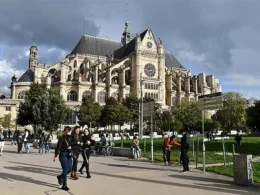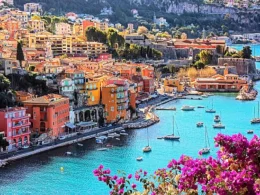Planning a trip to France can be an exciting endeavor, but it requires careful preparation to ensure a smooth and enjoyable experience.
This ultimate checklist for traveling to France aims to provide comprehensive guidance, covering essential travel documents, packing tips and must-haves, cultural etiquette and tips, as well as health and safety precautions.
Whether it’s your first time visiting this culturally rich and diverse country or you’re a seasoned traveler, this checklist will serve as a valuable resource to help you navigate the intricacies of French travel.
By following these recommendations, you can enhance your journey, avoid common pitfalls, and make the most of your time in France.
Essential Travel Documents
Before traveling to France, it is crucial to ensure that you have all the essential travel documents in order.
Firstly, check the visa requirements for your nationality. France is a part of the Schengen Area, and most visitors can enter for short stays without a visa. However, it’s important to confirm the specific requirements based on your citizenship.
Additionally, ensure that your passport is valid for at least six months beyond your planned departure date.
It’s also wise to exchange some currency before arrival or at the airport to cover immediate expenses.
While French is the official language, having a language translation app or a pocket dictionary can be helpful, especially if you plan to explore beyond the tourist areas.
These preparations will help ensure a smooth and enjoyable trip to France.
Packing Tips and Must-Haves
When packing for a trip to France, it is essential to prioritize versatile and comfortable clothing suitable for various weather conditions and cultural activities. The following clothing essentials and packing organization tips can help ensure a smooth and enjoyable travel experience:
- Versatile Clothing: Pack items that can be easily mixed and matched, such as neutral-colored tops, bottoms, and outerwear.
- Comfortable Shoes: Bring comfortable walking shoes for exploring cities and towns, as well as a pair of dressier shoes for evenings out.
- Weather-appropriate Attire: Be prepared for changing weather by packing layers, including a lightweight jacket or sweater, and a compact umbrella.
- Cultural Accessories: Consider bringing a scarf or shawl that can be used for visiting religious sites or dressing up an outfit for dinner.
- Packing Cubes or Compression Bags: Use these to maximize luggage space and keep your belongings organized throughout your trip.
Cultural Etiquette and Tips
As a traveler in France, it is important to be mindful of cultural etiquette and norms to ensure respectful interactions and a positive experience.
When it comes to dining customs, remember to greet the staff upon entering a restaurant, use utensils correctly, and keep your hands on the table, not in your lap. Additionally, it’s polite to wait for the host to initiate the toast before taking a sip during a meal.
In terms of greeting gestures, the French commonly greet each other with a light handshake, and it’s customary to address people using titles such as ‘Monsieur’ or ‘Madame’ followed by their last name. Avoiding overly personal topics during initial conversations and using ‘vous’ instead of ‘tu’ when addressing strangers are also important social customs to keep in mind.
Health and Safety Precautions
It is essential for travelers to France to be aware of the health and safety precautions that should be taken to ensure a safe and enjoyable trip.
When traveling to France, it’s important to consider the following:
- Emergency Numbers: Familiarize yourself with the local emergency numbers such as 112 for general emergencies and 15 for medical emergencies.
- Insurance: Ensure you have comprehensive travel insurance that covers medical expenses and emergency repatriation.
- Food: Be cautious of food hygiene and opt for reputable establishments. Familiarize yourself with common French dishes to avoid allergens.
- Allergies: If you have food allergies, carry a translated card detailing your allergies in French to communicate with restaurant staff and chefs.
- Medical Supplies: Carry any necessary medications and a basic first-aid kit for minor emergencies.
These precautions will help ensure a safe and worry-free experience while traveling in France.
Frequently Asked Questions
What Are Some Common French Phrases or Expressions That Would Be Useful to Know While Traveling in France?
When traveling in France, it’s essential to know common French greetings and pleasantries to navigate language barriers. Additionally, mastering basic phrases for ordering food and shopping will greatly enhance your experience and interactions with locals.
Are There Any Specific Etiquette or Customs to Be Aware of When Dining in French Restaurants?
When dining in French restaurants, it’s essential to adhere to the country’s dining etiquette. Always be mindful of dietary restrictions, dress elegantly, and remember that tipping is included in the bill. Understanding these customs enhances the dining experience.
What Are Some Lesser-Known, Off-The-Beaten-Path Destinations in France That Are Worth Visiting?
When seeking hidden gems in France, explore the picturesque villages of Alsace like Eguisheim or the medieval town of Pérouges. Embrace unique experiences and local traditions in lesser-known destinations such as the stunning Gorges du Verdon or the charming village of Saint-Cirq-Lapopie.
Are There Any Traditional French Festivals or Events That I Should Try to Experience During My Trip?
Traditional French festivals and cultural events offer a glimpse into the country’s rich heritage. From the vibrant Carnival of Nice to the revered Bastille Day celebrations, experiencing these local traditions during your trip adds depth to your exploration of France.
What Are Some Important Emergency Contact Numbers or Resources to Have on Hand While Traveling in France?
In France, it’s essential to have important emergency contact numbers on hand due to potential language barriers. Be sure to have access to local emergency hotlines and the locations of nearby medical facilities for peace of mind while traveling.










